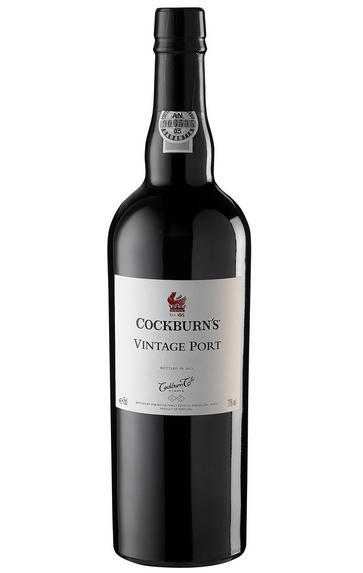
2016 Cockburn's, Port, Portugal
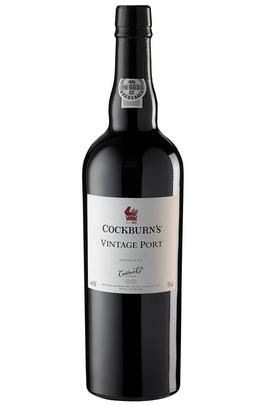
Critics reviews
Drink 2035-2065
Jancis Robinson, JancisRobinson.com
James Suckling, JamesSuckling.com
About this WINE
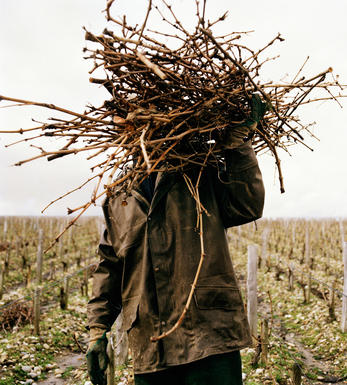
Cockburn
Cockburn was founded nearly 200 years ago by Scotsman, Robert Cockburn, who returned to Portugal after first visiting the country as a soldier fighting under Wellington in the Napoleonic Wars. Originally it was based in the Douro valley, the traditional centre of Port production. A year later, Cockburn moved east to the Upper Douro Valley.
Cockburn has a reputation as innovators, which, in such a traditional and conservative industry is sometimes considered disregard for the “rules”.
It has, however, brought them great success, namely the revival of the Touriga Nacional vine. A grape recognised for its exceptional quality. Touriga Nacional now accounts for 35% of Cockburns yield.
Cockburns has led the way in modernising standards of wine and environmental management and in 1994 it became the first wine company to be awarded the ISO 9002 for quality management, wine making and production operations.
The owners of Cockburns, Beam Global Spirits, has recently decided to divest the Cockburn’s Port Brand to the Symington Family Estates, the leading producer of premium quality ports.
Following the transaction, the Symington family intends to apply their skill and expertise in the production of Port, which dates back for generations, towards further development and growth of Cockburn’s around the world.
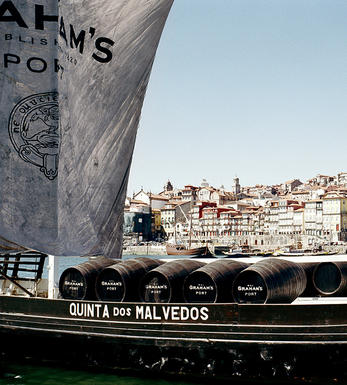
Vintage Port
Vintage Port accounts for only a small percentage of the total Port production - which includes Tawny, Ruby, Late Bottled Vintage, Single Quinta Vintage styles, among others - but is the finest, longest-lived and most expensive style that is produced. The best are as good as any wine in existence.
With the exception of legendary vineyards like Quinta do Noval Nacional and Quinta do Vesuvio, Vintage Port is made from a blend of wines from a producer's finest plots. It is aged for around 18 months in wooden casks before bottling; from then on the watch-word is patience. At least 15 years ageing – and for the top wines it will be significantly longer – is required before the tannins, spirit and fruit are fully integrated. Indeed, the finest examples can last well over 50 years.
Vintage Port is only made in exceptional years (normally around three times per decade) with considerable stylistic variation between different years and shippers. However, they all share a sweet, warming, spicy richness, power and complexity. In other good but not great vintages, many shippers produce a Single Quinta Vintage Port from their finest vineyard. These are made in the same way and have the same style as Vintage Port but tend to mature faster and are less profound. All Vintage Port throws a sediment as it matures, and thus requires decanting.
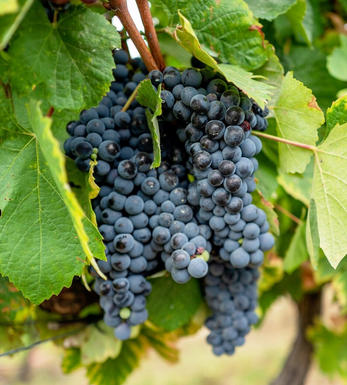
Port Blend
There are around 40 different grape varieties permitted in the production of Port - however the vast majority of Ports are produced from a blend of 5 grapes - Touriga Nacional, Touriga Francesca, Tinta Barroca, Tinta Roriz, and Tinto Cão.
Touriga Nacional produces small, dark-skinned grapes that produce opaque black wines of great extract and high tannins - it gives grip, body, and structure to the blend.
Touriga Franca has a thinner skin and consequently produces wines lighter in colour and tannins than Touriga Nacional. It contributes fruit, aroma, suppleness and roundness.
Tinta Roriz is the Portuguese name for Tempranillo and its high sugar content and low acidity contribute colour and fruit.
Tinta Barroca which is normally grown at highish altitudes and on north-facing slopes, is prized for producing wines of delicacy, finesse and with smooth, velvety fruit. It brings elegance and sweet, ripe fruit to the final blend.
Finally Tinto Cão produces fine and complex wines, though it is probably the least important of the 5 grapes as its painfully small yields have reduced plantings to almost insignificant levels.


Buying options
Add to wishlist
Description
This is part of our January 2023 sale. The price shown above includes a saving of 20%. Prices valid till January 24th and applies to 75cl bottles only and excludes BBX listings.
The 2016 Vintage Ports have finally hit the market. Cockburn is one of the great historic properties in the Douro Valley, which is now part of the Symington portfolio (along with Graham’s, Dow’s and Warre’s and more). The 2016 Cockburn is 62 percent Touriga Nacional, 21 percent Touriga Franca, nine percent Sousão and eight percent Alicante Bouschet, predominately hillside grapes from the family’s Quinta dos Canais vineyard, which has been the backbone of Cockburn Vintage Port for over 100 years. The nose on the 2016 shows fragrant red and black fruit, wild flowers, clove, ginger and spice. The palate offers extracted red fruits with layers of spice and a lovely acidity throughout. Very dry and complex with incredible length, hide this away somewhere dark and look at it again in at least 10 years. Drink 2028-50.
Mike Jordan, Private Account Manager
wine at a glance
Delivery and quality guarantee